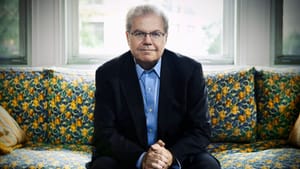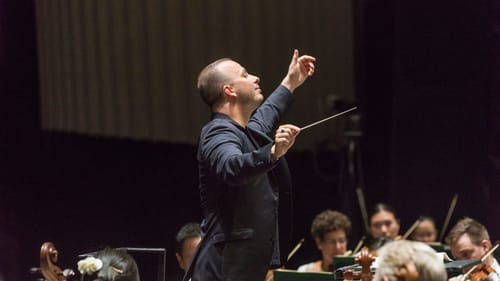Stay in the Loop
BSR publishes on a weekly schedule, with an email newsletter every Wednesday and Thursday morning. There’s no paywall, and subscribing is always free.
Piano Manny
The Philadelphia Orchestra presents Brahms’s Piano Concerto No. 2 with Emanuel Ax

Emanuel Ax commands an audience. Fans of the Polish-born American pianist came out in droves to hear him perform Brahms’s Piano Concerto No. 2 in B-flat major, Op. 83, with the Philadelphia Orchestra under the baton of music director Yannick Nézet-Séguin. Those who managed to grab a ticket got more than their money’s worth.
Nearing 70, Ax performs with the nimble dexterity of a pianist half his age. Although he joked in a recent interview with Nézet-Séguin that his senior status might inspire some leniency and understanding over dropped notes or smudged phrases, none could be detected at the second performance of his engagement. Instead, the audience saw one of the great classical artists of his generation at the peak of his ability, ably summiting one of the most difficult assignments in the repertory.
An orchestral duet
The concerto essentially functions as an hourlong duet between the soloist and the orchestra. In pure Romantic fashion, the piano stands as an iconoclastic individual against the ensemble voice surrounding it. Occasionally, that individual gets trapped within those greater forces. Ax excelled at both the bombastic solo lines and the blended symphonic sound, his piano joining the orchestra without disappearing into it.
Ax plays with a lighter touch than many of his contemporaries, though the result is no less lush. This approach privileged elegant phrase-shaping rather than brute force, resulting in an expansive, unhurried performance. Nézet-Séguin reigned in his penchant for brisk tempos, complementing Ax’s leisurely interpretation.
Nézet-Séguin and the orchestra last presented this work two years ago, in a performance with soloist Hélène Grimaud that was full of sturm und drang. It was a pleasure to hear a different take, one that often sounded more like chamber music than a full-bodied cry to the heavens, without losing any of the piece’s essential drama.
If an orchestra is to repeat cornerstone works in the repertory at regular intervals, it should continually strive to bring something new to the table. In fine partnership with Ax, it certainly does here.

After intermission
The unusually full crowd thinned considerably after intermission, with many presumably choosing to beat the traffic rather than face an Ax-less second half. What a shame. Those who left missed the U.S. premiere of Stacey Brown’s Perspectives, an imperfect but nonetheless intriguing tone poem.
Nézet-Séguin led the first performances of this work last year with Montreal’s Orchestre Métropolitain, and he clearly has affection for it. Brown composed the piece in response to a sculpture by the artist Michael Longtin, and over the course of its 10 minutes, it embodies the swirling, changing reaction one can have when considering a work of art. A sense of discovery leads to familiarity, initial wonder settles into quiet admiration. Percussion that may represent a quickening pulse eventually recedes.
At times, Brown’s musical language can sound undistinguished, like a film score one forgets almost instantly. This most clearly seemed the case in her writing for strings. But elsewhere, as in her opening phrases for flute and piccolo, she accomplishes something singular and exciting. This is clearly a composer to watch.
The program also featured an impassioned performance of Dvořák’s Symphony No. 7 in D minor, Op. 70, and a fine postlude featuring organist Peter Richard Conte playing Brahms, Dvořák, and Widor. Although the evening’s varied elements represented different generations and musical styles, everything melded together beautifully, like Ax’s piano weaving itself into the texture of the orchestra.
You can help keep BSR going strong in 2019 and beyond. Make your gift here.
What, When, Where
Brahms, Piano Concerto in B-flat major, Op. 83; Brown, Perspectives; Dvořák, Symphony No. 7 in D minor, Op. 70. Philadelphia Orchestra. November 29 through December 1, 2018, at the Kimmel Center’s Verizon Hall, 300 S. Broad Street, Philadelphia. (215) 593-1999 or philorch.org.
Sign up for our newsletter
All of the week's new articles, all in one place. Sign up for the free weekly BSR newsletters, and don't miss a conversation.

 Cameron Kelsall
Cameron Kelsall